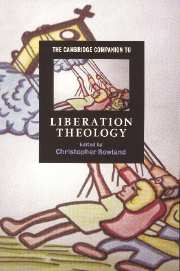Book contents
- Frontmatter
- Introduction
- Part one Contemporary liberation theology
- Part two Aspects of liberation theology
- 5 The origins and character of the base ecclesial community: a Brazilian perspective
- 6 The Bible and the poor: a new way of doing theology
- 7 Liberation and reconstruction: the unfinished agenda
- Part three Analysis and criticism
- Epilogue: the future of liberation theology
- Select bibliography
- Index
7 - Liberation and reconstruction: the unfinished agenda
from Part two - Aspects of liberation theology
Published online by Cambridge University Press: 28 May 2006
- Frontmatter
- Introduction
- Part one Contemporary liberation theology
- Part two Aspects of liberation theology
- 5 The origins and character of the base ecclesial community: a Brazilian perspective
- 6 The Bible and the poor: a new way of doing theology
- 7 Liberation and reconstruction: the unfinished agenda
- Part three Analysis and criticism
- Epilogue: the future of liberation theology
- Select bibliography
- Index
Summary
Liberation theology - an umbrella term embracing a number of particular movements, including African, black, feminist, and womanist theologies - is self-consciously contextual. While having certain characteristics in common, specific liberation theologies need to be understood in terms of their particular contexts. In this chapter attention is first given to the broad and inclusive tenets of Latin American liberation theology. The second part explores some of the challenges facing liberation theologians in the wider context defined by the post-cold war period; in particular, the situation of the poor in the changing contexts of debate. Specific attention is given to the changing South African context within which the present writer is located.
There is, of course, no one prevailing context in any particular Latin American country or in South Africa. Divisions of class, race, gender and choice continue to ferment the liberation theology debate, and each of these is, in turn, profoundly affected by the changes that have taken place in different regional contexts since the 1960s. The Medellín and Puebla conferences of 1968 and 1979 gave formative expression to Latin American liberation theology, which formed part of the revolutionary milieu that swept South and Central America during this time. In Europe 1968 was the year of the Prague Spring. In North America the 1960s were the time of the Black Power movement. In South Africa, Black theology and liberation theology were born in the late 1960s, reaching their highwater mark with the publication of the Kairos Document in 1985, while Black theology regained a sense of prominence in the debate at more or less the same time. The divide between the forces of resistance and liberation, throughout this period, was crisp, clear and relatively uncomplicated.
- Type
- Chapter
- Information
- The Cambridge Companion to Liberation Theology , pp. 153 - 176Publisher: Cambridge University PressPrint publication year: 1999
- 3
- Cited by

